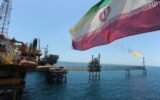
Despite the annual increase in China's crude oil imports in September, the country's imports declined compared to August, reaching the lowest level from the beginning of the year. At the same time, imports from Iran have also fallen to the lowest level since January.

A member of the Islamic Consultative Assembly's Program, Budget, and Accounting Commission stated: "All state-owned companies and mines should be transferred to the private sector because most of these complexes are loss-making, but oil, like natural resources, is a national issue and is among the assets that should not be transferred to the private sector."

The CEO of the National Southern Oilfields Company announced: "Aghajari Company has reached its maximum oil production capacity despite the limitations."

A few days ago, the Minister of Oil announced that two new layers of oil and gas were discovered during the drilling of the second well of the Pazan field, located on the border of the three provinces of Bushehr, Fars, and Kohgiluyeh-Bovir Ahmad. This news contains 5 basic points.

In a statement, the National Iranian Oil Company said in a statement that the British Court of Appeal was confirmed to be confirmed by the London Oil Industry Pension Fund, the legal follow -up of legal and international paths to cancel the ruling was continuing.

Over the past years, and especially since June last year, we have been adopted by the law of Shipuct, but with the necessary measures we were able to virtually bypass the boycott and make oil sales favorable.

In line with fulfilling its social responsibilities, the National Iranian Oil Company, in cooperation with the Imam Khomeini Relief Committee, distributed 45,000 packages of stationery and educational items among needy students.

The CEO of the National Southern Oilfields Company emphasized the need to conduct up-to-date assessments of recoverable reserves of oil and gas fields in order to plan more accurately and achieve the goals of the Seventh Development Plan.

The UK Court of Appeal rejected the National Iranian Oil Company's appeal and upheld the previous London court ruling on the confiscation of the NIOC House building.

The oil minister said about the rumor of budgeting for gasoline imports in the first six months of this year: The budget law provides 6 trillion tomans for gasoline imports, which is about half of the projected budget for the year.










